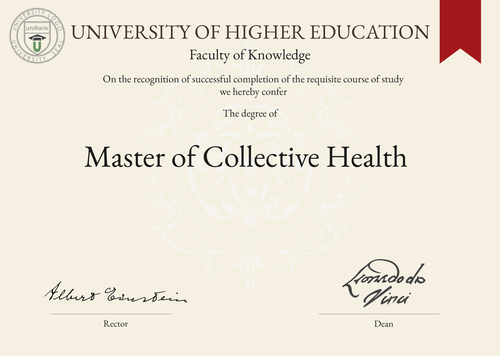
Master of Collective Health (MCH)
Guide to Master of Collective Health Program/Course/Degree
Master of Collective Health (MCH)

Program Name
Master of Collective HealthProgram or Degree abbreviation
MCHDuration range
The duration of the Master of Collective Health program can vary depending on the country or university. Typically, it ranges from 1 to 2 years.Tuition range
The tuition fees for the Master of Collective Health program can vary depending on the country or university. The range can vary from affordable to expensive, depending on the location and reputation of the institution.Overview
The Master of Collective Health program is designed to provide students with a comprehensive understanding of public health issues and equip them with the necessary skills to address collective health challenges. This program focuses on promoting health and preventing diseases at a population level.Curriculum Overview by year
The curriculum of the Master of Collective Health program is structured to cover various aspects of public health. The coursework typically includes subjects such as epidemiology, biostatistics, health policy and management, environmental health, social and behavioral sciences and research methods. Students may also have the opportunity to specialize in specific areas of public health based on their interests and career goals.Key Components
The key components of the Master of Collective Health program include gaining a strong foundation in public health principles, developing analytical and critical thinking skills, understanding the social determinants of health, learning to design and implement public health interventions and conducting research in the field of public health.Career Prospects
Graduates of the Master of Collective Health program have a wide range of career opportunities in the field of public health. They can work in government health departments, non-profit organizations, research institutions, international health agencies and healthcare organizations. Career options may include roles such as public health analyst, epidemiologist, health policy advisor, program manager and community health educator.Salary Expectations
The salary expectations for individuals with a Master of Collective Health degree can vary depending on factors such as the country, job position and level of experience. Generally, public health professionals with a master's degree can expect competitive salaries that are commensurate with their expertise and responsibilities. For a more accurate understanding of salary expectations, you can utilize the Job Sites Search Engine, from our sister site jobRank, which searches over 4,600 job sites worldwide. Make sure to specify not only the job title but also the country you are interested in.Conclusions:
It is important to note that the duration, tuition fees, curriculum, key components, career prospects and salary expectations of the Master of Collective Health program can vary depending on the country or location where you choose to study the program, as well as the university you select. To find specific information about where this degree is offered worldwide, visitors can utilize the uniRank World Universities Search Engine, which provides comprehensive information on universities offering the Master of Collective Health program.World Universities Search Engine
search for Master of Collective Health (MCH) and add the Location (country, state etc.) or specific University you are interested in studying at.
Query examples:
- Master of Collective Health (MCH) United States
- Master of Collective Health (MCH) United Kingdom online
- Master of Collective Health (MCH) Australia international students
- Master of Collective Health (MCH) University of California
- Master of Collective Health (MCH) University of London tuition fees
- Master of Collective Health (MCH) University of Sydney scholarships
Share Program/Course
Interesting? Share this program/course/degree info with your friends now.